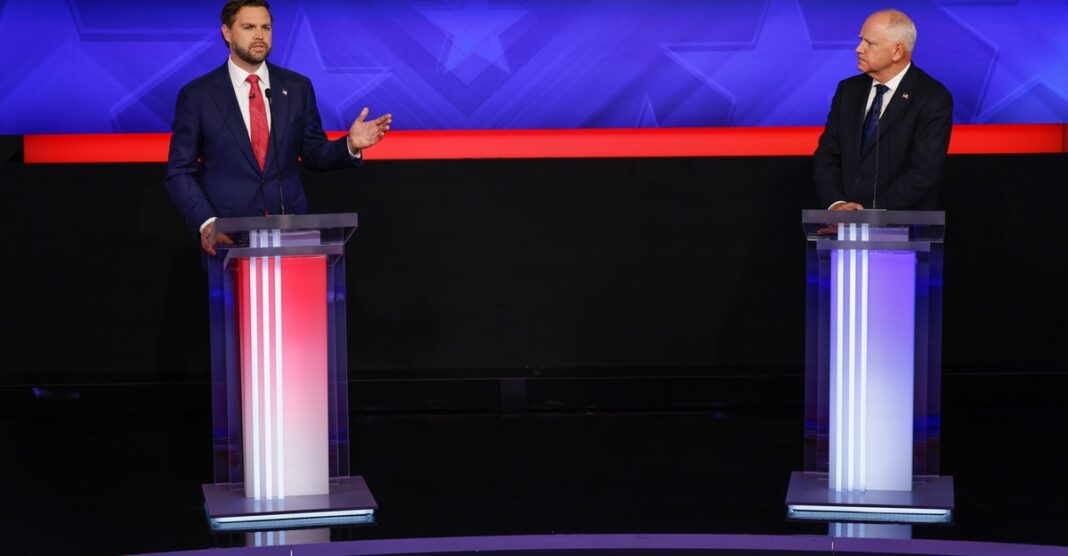In the lead-up to last night’s vice-presidential debate between J. D. Vance and Tim Walz, CBS’s decision not to have moderators provide live fact-checking became a minor controversy. One pundit argued that this amounted to giving the truth-challenged Vance “license to lie,” and many of the Democratic faithful voiced similar complaints on social media. Mother Jones went so far as to precheck the debate. The X account for the Kamala Harris campaign declared: “JD Vance is going to lie tonight. A lot. So we are going to give you the facts.” It then fact-checked the event in real time, pointing out Vance’s dodges and deceptions.
At one moment early in the debate, the moderators seemed to struggle to suppress their journalistic impulse to correct the record. Contradicting Vance’s talking points about “illegal immigrants” in Ohio, CBS’s Margaret Brennan said, “Just to clarify for our viewers: Springfield, Ohio, does have a large number of Haitian migrants who have legal status,” earning an irritated objection from Vance. “The rules were that you guys weren’t going to fact-check,” he protested.
Other than that one “clarification,” the moderators mostly didn’t. But contrary to what liberals might believe, the lack of fact-checking probably didn’t help or hurt Vance (and by extension, Donald Trump). The uncomfortable truth is that if, journalistically, news outlets like CBS have a duty to contest lies, politically, fact-checking is less magic bullet and more magic beans.
Since Trump rode down his gaudy tower’s escalator to announce his presidential bid nearly a decade ago, the public has been inundated with a deluge of his lies. And as the media, voters, and Trump’s opponents attempted to figure out how to rein in a politician of unprecedented perfidy, fact-checking and combatting disinformation found new salience in public life. In the intervening years, fact-checking has transformed from a necessary piece of journalistic due diligence into a fetish object for Trump-weary Democrats. Some Democrats came to expect too much from fact-checking, and often seem to accord debunking a kind of political power to beat back Trumpism.
The 45th president has been subjected to a sustained fact-checking campaign for the better part of a decade. I do not think it’s an exaggeration to say that no politician in American history has been fact-checked more thoroughly than Donald Trump. And yet, all those years of myth-busting have had next to zero impact on his electoral viability. He managed to attract new voters in the last election. And even as he spouts racist nonsense about immigrants—thoroughly myth-busted by journalists—he is increasing his share of non-college-educated voters of color in this election.
My point isn’t that Democrats should give up on fact-checking, but that they need to remember that debunking is not a substitute for politics. At the presidential debate last month, when Trump repeated the conspiracy that Haitian immigrants were eating pets in Springfield, Ohio, the moderator duly corrected this bit of xenophobic fearmongering. For her part, Harris seemed to revel in Trump’s lies being called out live on air. “Talk about extreme,” she said, laughing, seeming to enjoy the moment.
What Harris didn’t do was take the opportunity to articulate anything about her worldview or policy positions on immigration, or point out that Springfield had welcomed immigrants as a way to combat the economic toll of decades of deindustrialization, which was itself the result of conservative trade policies that helped offshore manufacturing. Basking in the glow of the freshly checked fact, she forgot to outline a positive agenda, as though beating Trump were a game of whack-a-mole in which you win by smacking down all the fibs that pop up.
Does anyone really believe that the kind of voter who hears Trump blather about cat-barbecuing immigrants—and isn’t immediately disgusted—is likely to be moved by a CNN moderator tsk-tsking him and explaining that, actually, that isn’t true? Is any right-leaning swing voter or nose-holding Republican actually going to rethink their vote when they log on to the CBS website—if they even bother—and discover that Vance lied when he claimed that Harris is not invested in clean air or that she had been appointed “Border Czar”? For that matter, is any Harris-pilled Democrat going to rethink their vote when they find out that Walz lied about being in China during Tiananmen Square?
Arguably, CBS should have fact-checked the debate, because it is a news outlet, news outlets provide journalism, and journalists fact-check. But journalists should also be honest about the limits of the practice. Because calling out every falsehood is impossible, journalists are forced to make judgment calls about which lies are significant enough to merit dispelling. Republicans distrust that selection process, rolling their eyes at misinformation-wrangling, which they believe is unfairly directed at their co-partisans, while Democratic dishonesty is given a pass. And all too often, journalists call out brazen lies while committing lies of omission themselves. Many journalists spent months ignoring the truth that Joe Biden was deteriorating before their eyes, and had the audacity to tell the American public that videos of the octogenarian president looking visibly confused were something called “cheap fakes.”
Pinning political hopes on fact-checking isn’t just bad for journalism, which gets reduced to a partisan instrument. It’s also bad for Democrats, causing them to forget to make a clear case to the American public that they have better policies. Donald Trump remains a fixture in American life not because of insufficient fact-checking—everyone, including his supporters, knows that he’s a bullshit artist—but because politicians, Republicans and Democrats alike, have failed to make a convincing case that they have truths on offer that are better than his lies.



